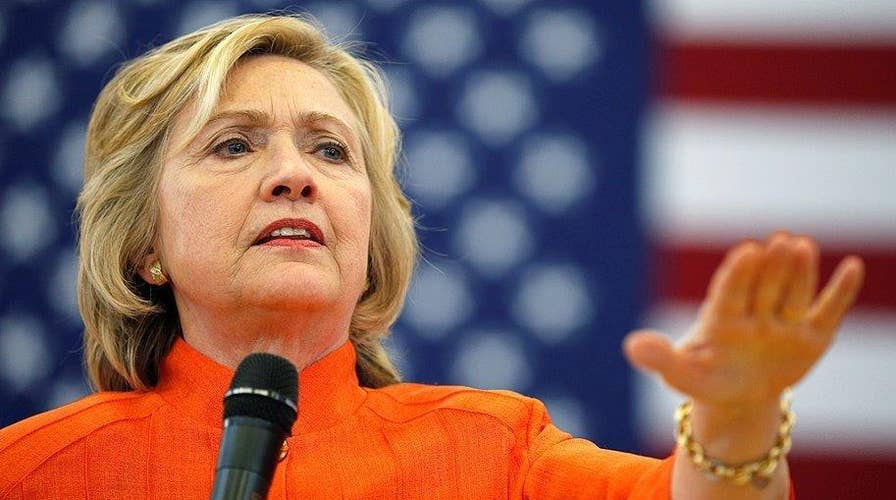Could a probe of Hillary's email server be reopened?
James Comey's firing and new FBI leadership could spark a new review of the 'closed' Clinton case, immunity deals. Could Pres. Trump still get a chance to 'lock up' Clinton? #Tucker
As President Trump reportedly questions Russian President Vladimir Putin on alleged Russian interference in the U.S. election, there is a growing focus on a different, as-yet-unanswered question: Where are the Democratic National Committee servers that were allegedly breached by Russian hackers, and has anyone in the government been able to look at them?
The notion that Russia interfered with the U.S. election is based in part, if not largely, on an investigation into the DNC's computer servers. The servers themselves, however, have yet to be viewed by a single government agency. Some lawmakers are hoping to change that amid growing questions surrounding the Russia narrative.
DNC EMAIL SERVER MOST WANTED EVIDENCE FOR RUSSIA INVESTIGATIONS
In the summer of 2016, the cybersecurity firm CrowdStrike revealed that "two separate Russian intelligence-affiliated adversaries" had hacked into the DNC network in May 2016. The group was reportedly called on by the DNC when the committee began to suspect something was up with its network in the months leading up to CrowdStrike's investigation.
CrowdStrike, a private company, has assisted with government investigations in the past. The company noted in its report on the apparent DNC breach that the attack had been perpetrated by a group that CrowdStrike had previously encountered while investigating a 2015 hack on the unclassified networks of the White House, State Department, and Joint Chiefs of Staff.
The firm has clients on both sides of the political aisle, working with groups like the DNC and reportedly the National Republican Congressional Committee. Critics have noted that the company's investors reportedly include the likes of employees of Google, a company that gave millions to the Clinton campaign, as well as a company run by a former staffer under both the Clinton and Obama administrations, Timothy Geithner.
TRUMP HITS PODESTA OVER DNC SERVER; EX-CLINTON CHAIR FIRES BACK
What draws the most questions, however, is the fact that CrowdStrike staffers are the only people to ever have investigated the DNC e-mail servers that contain evidence of Russian meddling, despite multiple requests by the FBI. Now, some lawmakers are demanding access as new questions are raised about what else might be in those servers, and why no one in the government has been permitted to look at them.
Sen. Lindsey Graham, R-S.C., is leading the Judiciary Committee investigation into alleged Russian meddling, and recently suggested he wants "to find out from the company [that] did the forensics what their full findings were."
Up until now, CrowdStrike has been providing investigators with what former FBI Director James Comey described in June as the "relevant forensic information... needed to understand the intrusion." The servers themselves, however, are another story.
While Comey suggested that his investigators believed they had sufficient information to understand the problem, he admitted in January before the Senate Intelligence Committee that his investigators were denied access to the physical servers. "Forensic folks always prefer to get access to the original device or server that's involved," he suggested.
Comey couldn't say why his people weren't given access, and testified that after "multiple requests at different levels... what was agreed to is that the private company would share with us what they saw."
Comey's testimony came just days after a Buzzfeed report in which the DNC claimed the bureau "never requested access" to the servers in question, and that it had been "providing access to all of the information uncovered by CrowdStrike — without any limits."
By March 2017, Comey, who was still FBI director at the time, told the House Intelligence Committee that his investigators still had not accessed the servers analyzed by CrowdStrike, but maintained that his investigators believed they had an "appropriate substitute."
Just last month, Jeh Johnson, the former Homeland Security secretary under President Obama, told the House Intelligence Committee that when his department offered to help the DNC with its hacking investigation, he was told the DNC "did not feel it needed DHS’ assistance at that time."
Incoming House Oversight chairman Trey Gowdy, R-S.C., reacted to Johnson's testimony by suggesting "there may be something else on that server [that the DNC] didn't want law enforcement to see."
In a tweet, President Trump suggested the DNC's apparent refusal to accept help from DHS was "all a big Dem HOAX!"
A British think tank that apparently worked with CrowdStrike recently suggested the firm has misinterpreted data in the past, and some experts have called the group's evidence of Russian interference in the U.S. election "flimsy."
CrowdStrike has defended its investigation multiple times, suggesting on one occasion that efforts to throw cold water on its conclusions could be part of a "Russian Intelligence disinformation campaign."













































